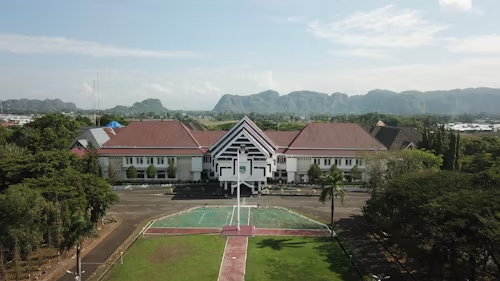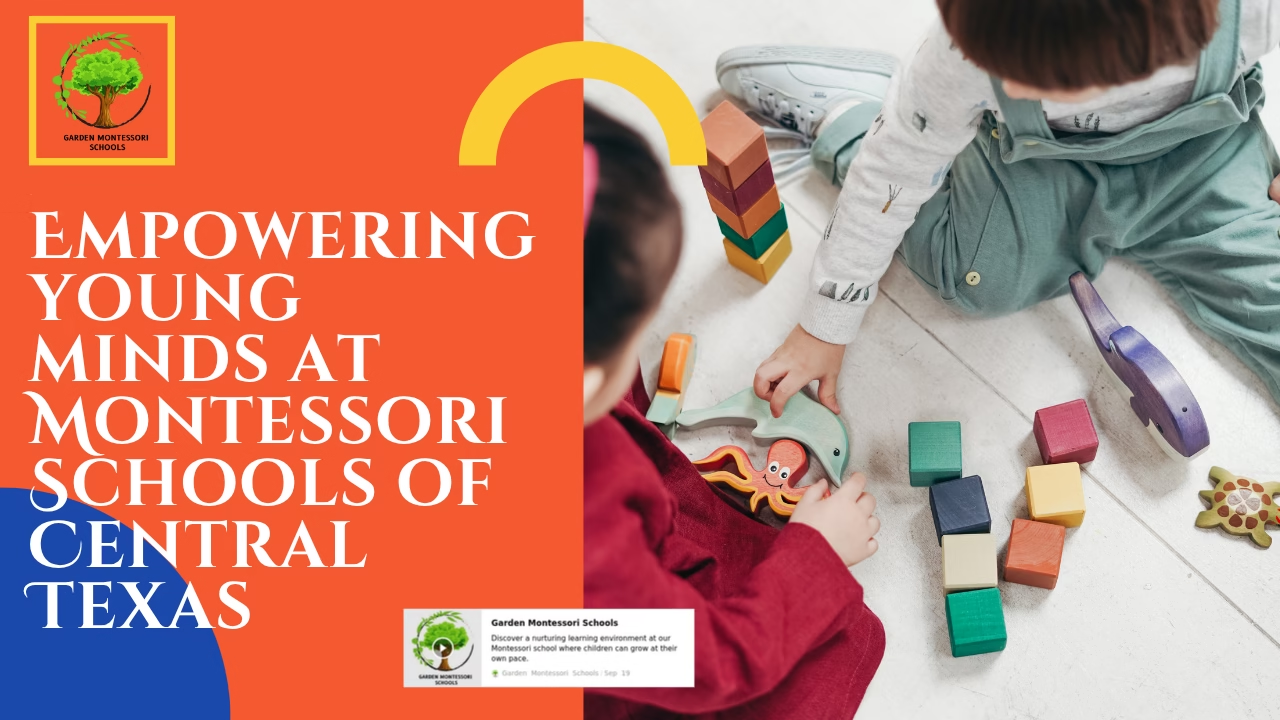The methods of Montessori are known all over the world because of the unique knowledge that children acquire and therefore the Montessori Garden quite interestingly adopts this philosophy.
It makes use of teaching that has a nature-based model together with the Montessori concepts of self-direction, respect and creativity.
For the purpose of this blog, we will examine how The Montessori Garden educates children at a very young age, what makes it exceptional when compared to other educational approaches, and how it is consistent with the ideal of well-rounded child growth.
It is time to examine how this philosophy impacts the development and education of children and its practical applications.
Why Is the Montessori Garden Concept Important for Education?
The Montessori Garden emphasises the relationship between children and nature as a tool for educational growth. Educational growth is not confined to the whiteboard and paper. It emphasises the importance of sensory experiences while travelling outdoors.
Children learn firsthand how to cultivate plants and animals, and therefore they learn about responsibility and independence.
This helps self-pacing students to learn by bringing together relevant activities in which they gain access to the real world and therefore enhance their learning experience rather than sitting in a classroom.
At the same time, it also helps to build up a child in regards to emotional intelligence. This is possible as children engage in such activities as their growth where they have to learn patience, social interaction, and the importance of hardship and perseverance.
These are essential life skills which will aid success in their entire lifetime. People of the Montessori Garden do not focus solely on achieving academic goals but rather talk about the importance of nature and its well-being enhancing the child’s holistic wellbeing in the process.
How Does The Montessori Garden Foster Appreciation For Nature?
Nature is an important part of Montessori education, and The Montessori Garden builds onto this. Placing, watering and watching the growth of plants imbues children with the interest towards and responsibility for nature.
Such experiences self-service impressions in the children of the importance of life cycles and their contribution towards the sustainability of life.
Moreover, children participate in sensory activities by feeling the dirt, smelling the blossoms and watching bugs. These kinds of experiences promote awareness and creativity.
Through integrating education and nature, The Montessori Garden nurtures individuals with an environmentally-conscious attitude who love nature.
Why Are Practical Life Skills Development Considered Important In The Montessori Garden?
Practical life skills would be one of the core components of a Montessori education. In The Montessori Garden, such skills are developed through the work in the garden which encourages self-reliance and accountability.
For example, children learn how to tend to and water plants as well as how to harvest growing vegetables and fruits, giving them the feeling of success.
Learning by doing extends beyond classroom walls and readies children for everyday situations. Activities like composting, weeding, and putting away equipment build appropriate behaviour and management skills.
When children do these things, they learn skills appropriate to several aspects of life that develop a self-assuredness and a can-do attitude.
In what Ways Does The Montessori Garden Enhance Cognitive Growth In Children?
The Montessori approach to problem-solving tends to have a positive impact on the growth of an individual as well as assist the child in starting critical thinking at an early age which is imperative for them in the future.
Introducing scientific processes such as photosynthesis and plant structure to students can involve them in observing how the plants respond to various environments. Children hypothesise, carry out experiments, and learn through exploration.
Such gardening practices put to the test and enhance academics at the same time. For instance, when young ones are measuring the extent to which plants have grown, they involve some maths.
Or while aiming to do the flowering sketches, their artistic expression also improves. Theoretical knowledge and practical knowledge are unified with the help of the Montessori Garden ensuring wholesome education.
How Does The Montessori Garden Facilitate The Development Of Positive Emotions?
Engagement with the work built up in The Montessori Garden enhances one’s emotional wellness. Activities involving nature have been shown to alleviate stress and anxiety while boosting focus and happiness.
Children learn how to cope with specific problems such as plant diseases or extreme weather conditions, which cultivates resilience in them.
The garden also encourages children to work together with their classmates, thus helping them to establish their social bonds.
With children collaborating on common chores such as watering or planting, they become empathetic and learn to work as a team.
Such a warm environment will promote emotional development in addition to the educational success children will achieve.
How Does The Montessori Garden Foster Creativity in Children?
The environment provided by the Montessori Garden is conducive to the development of creativity.
Children are free to create specific projects like making a flower bed or constructing a pond. Such autonomy encourages creativity and enhances the children’s problem-solving skills.
Creative arts are utilised as children draw plants and craft items with bark, as well as sing songs about the garden.
Such artistic activities promote originality and self-exploration, allowing children to harness their gifts amidst their enjoyment of plants.
Why Is Cultural Awareness Encouraged in The Montessori Garden?
The Montessori Garden helps children to be culturally aware as well. When children assist in planting different crops and flowers that are not from their culture, they learn about those cultures. Such lessons promote appreciation for other cultures.
Moreover, the garden space can be used to organise festivals such as Earth Day celebrations or Harvest festivals. These activities help children understand their community on a deeper level and encourage inclusivity among all walks of life.
How Does The Montessori Garden Enhance Physical Development?
Gardening is an activity that engages the children’s bodies physically. Children’s fine and gross motor skills are improved by activities like tool use and fundamental gardening tasks such as digging or planting. Such activities build the strength, coordination, and endurance of the young learners.
The outdoor environment promotes unstructured play, allowing for climbing, running, or digging. Such activities are important for physical development and maturation. The Montessori Garden ensures that education goes beyond sitting at tables and is primarily outdoor-based.
What Makes The Montessori Garden Be Considered As Montessori Gardens?
The Montessori Garden embodies the Montessori ethic by reinforcing independence, self-paced work, and an appreciation of nature. Children undertake and complete tasks such as sowing seeds and caring for the beds and the plants. Such control develops their self-esteem and sense of accountability.
Additionally, the garden embraces cross-curricular learning; biology, mathematics, and art. It also promotes investigation and understanding, two of the key aspects of Montessori education. The Montessori Garden aligns with the school’s philosophy of comprehensive education by fusing theory with practice.
What Are The Ways Parents Can Help The Montessori Garden?
Parents play an indispensable role in transferring the advantages of the Montessori Garden to their homes.
They can create a similar learning environment by planting small gardens or indoor plants. Such plants would require the children’s attention, fostering responsible behaviour and an appreciation for the environment.
Aside from these activities, parents can assist their children by engaging in activities related to the garden, such as reading books about plants or trees, or visiting a botanical garden which is very helpful in understanding plants.
These activities also reinforce what has been taught in the Montessori Garden, ensuring that the lessons learned are consistent throughout.
Conclusion:
They stimulate children’s bond with nature, everyday expertise, and creativity which in effect prepare the children for future endeavours. This is the reason why at Garden Montessori Schools, we apply The Montessori Garden as well as other relevant concepts from Memorial Garden Montessori to enhance children’s learning experience for better application of appropriate methods.
From planting the seeds of knowledge to raising barriers against the emotional storms of life, The Montessori Garden helps with much more than its title suggests. Come see us at our site and become part of the amazing holistic education narrative. Our programmes are available at Garden Montessori Schools.
FAQs For The Montessori Garden:
What makes The Montessori Garden unique?
The Montessori Garden is purposeful in nature and education as it connects with creativity and practical aspects. At Garden Montessori Schools, that helps cater for as well as raise awareness towards all babies.
How does The Montessori Garden support child development?
The Montessori Garden focuses on learning through practice which helps the child achieve cognitive, physical, and emotional development. Garden Montessori schools inculcate this concept in their cutting-edge teaching methodologies.
What place does nature hold in the Montessori educational system and how does it help children develop?
Nature helps develop curiosity, mindfulness, and responsibility for the environment. The Montessori Garden at the Garden Montessori Schools ensures that children acquire the essential skills while getting in touch with their surroundings in the most appropriate way.
What methods exist for parents to recreate the principles underlying the Montessori Garden?
Parents, inspired by Garden Montessori Schools, can try to replicate the Montessori Garden’s restaurants by involving children in small outdoor gardens or indoor gardening.
How do these approaches enhance children’s creativity at The Montessori Garden?
Gardening activities and artistic projects provide room for creativity to grow, and so do Garden Montessori Schools: they bring those practices into their children’s education, support innovation and self-expression.



